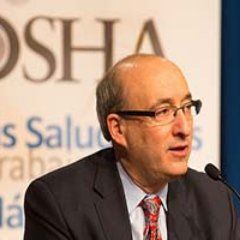-
Feb 6, 2025 |  time.com | Jamie Ducharme |David Michaels
time.com | Jamie Ducharme |David Michaels
By Jamie DucharmeFebruary 6, 2025 1:28 PM ESTAs the Trump Administration moves aggressively to shrink the federal government and cut its spending, the Occupational Safety and Health Administration (OSHA) may be next on the chopping block. Arizona Rep. Andy Biggs, a Republican, recently reintroduced legislation to abolish OSHA, which is part of the U.S. Department of Labor.
-
Dec 8, 2024 |  pilotonline.com | David Michaels
pilotonline.com | David Michaels
Column: Every state should be ready to protect workers under Trump
-
Dec 4, 2024 |  thederrick.com | David Michaels
thederrick.com | David Michaels
-
Dec 4, 2024 |  thebrunswicknews.com | David Michaels
thebrunswicknews.com | David Michaels
In the late 1970s, when Jimmy Carter was president, the Occupational Safety and Health Administration (OSHA) was less than a decade old and still developing basic workplace safety rules. As unimaginable as it is now, workers did not have the right to know the names and toxic properties of the chemicals to which they were exposed, or to be trained on protective measures. OSHA had proposed a "right to know" standard, but it was halted by the incoming administration of President Ronald Reagan.
-
Dec 4, 2024 |  miamiherald.com | David Michaels
miamiherald.com | David Michaels
In the late 1970s, when Jimmy Carter was president, the Occupational Safety and Health Administration (OSHA) was less than a decade old and still developing basic workplace safety rules. As unimaginable as it is now, workers did not have the right to know the names and toxic properties of the chemicals to which they were exposed, or to be trained on protective measures. OSHA had proposed a "right to know" standard, but it was halted by the incoming administration of President Ronald Reagan.
-
Dec 3, 2024 |  phillytrib.com | David Michaels
phillytrib.com | David Michaels
David Michaels is a professor at the Milken Institute School of Public Health at George Washington University. He served as assistant secretary of labor for the Occupational Safety and Health Administration from 2009 to 2017. Bloomberg Opinion
-
Nov 25, 2024 |  adn.com | David Michaels
adn.com | David Michaels
In the late 1970s, when Jimmy Carter was president, the Occupational Safety and Health Administration, or OSHA, was less than a decade old and still developing basic workplace safety rules. As unimaginable as it is now, workers did not have the right to know the names and toxic properties of the chemicals to which they were exposed, or to be trained on protective measures. OSHA had proposed a “right to know” standard, but it was halted by the incoming administration of President Ronald Reagan.
-
Nov 25, 2024 |  news.bloomberglaw.com | David Michaels
news.bloomberglaw.com | David Michaels
In the late 1970s, when Jimmy Carter was president, the Occupational Safety and Health Administration (OSHA) was less than a decade old and still developing basic workplace safety rules. As unimaginable as it is now, workers did not have the right to know the names and toxic properties of the chemicals to which they were exposed, or to be trained on protective measures. OSHA had proposed a “right to know” standard, but it was halted by the incoming administration of President Ronald Reagan.
-
Nov 25, 2024 |  news.bloombergtax.com | David Michaels
news.bloombergtax.com | David Michaels
XYour Choices Regarding Cookies and IdentifiersWe and our 150 third party partners use cookies and similar technologies ("Cookies") and hashed identifiers (e.g., a hashed version of your name, email address or phone number) to help us identify you on our site and third-party sites and to process certain information, such as your IP address and digital identifiers, to analyze site usage and provide you with relevant advertisements and content.
-
Nov 25, 2024 |  bloomberg.com | David Michaels
bloomberg.com | David Michaels
Employees exposed to toxins, extreme heat and other hazards shouldn’t expect relief from the incoming administration. In the late 1970s, when Jimmy Carter was president, the Occupational Safety and Health Administration (OSHA) was less than a decade old and still developing basic workplace safety rules. As unimaginable as it is now, workers did not have the right to know the names and toxic properties of the chemicals to which they were exposed, or to be trained on protective measures.

time.com | Jamie Ducharme |David Michaels
pilotonline.com | David Michaels
thederrick.com | David Michaels
thebrunswicknews.com | David Michaels
miamiherald.com | David Michaels